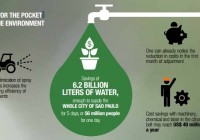17
fev
Citrus Growing in times of sustainability categories: Environment, Fundecitrus, Greening, Productivity, Research, sanitary control, Sustainability, technology, Water
Fundecitrus bets on natural enemies bioinsecticides and more rational water use practices.
The pathway to sustainable citrus growing goes through improvements in the tools to manage the orchard in order to maintain its health, in synch with new, latest innovation in production trends, with efficient use of natural resources and which are less impacting on the environment. Aware of such demand, Fundecitrus has looked in all its lines of research for new ways of helping citrus growers to maintain their orchards producing with cost efficiency and not adversely affecting the environment.
BIOLOGICAL CONTROL AND PHEROMONE
Fundecitrus approach concerning that strategy started in 1996, when a big surge of citrus fruit borer – a moth whose caterpillar penetrates the fruit and may cause significant crop losses – led the research to look for alternatives that could inhibit the advance of that pest. Researchers studied the insect’s habits, described its life cycle and were able to isolate its sex pheromone. The effort resulted in a trap, available to citrus growers since 2001, which is a low-cost, high-efficiency tool to monitor the fruit borer. A recent study by the “Luiz de Queiroz” Agricultural College (Esalq/USP) reported that the use of such trap prevented losses from US$132.7 million to 1.32 billion from November 2001 to 2013.
Also in 1996, another pest – the citrus leafminer – started causing serious problems to citrus growing due to its influence on the severity of citrus canker. Keeping up with its search for low-cost and low environmental impact tools, Fundecitrus oriented its efforts towards a fast and efficient solution. Studies were conducted regarding the feasibility of importing Ageniaspis citricola wasp, a leafminer parasitoid, from the US. By mid 1998 the first lot of this parasitoid, arrived in Brazil. After the quarantine procedure, the little wasps were reared in large scale and released in 200 orchards from 60 municipalities of Sao Paulo State. Tamarixia radiata, a natural enemy of the Asian citrus psyllid (Diaphorina citri), vector of the bacteria associated with HLB (huanglongbing/greening), is the newest sustainable tool used by Fundecitrus to fight against the world’s main citrus disease. The little wasp uses the psyllid nymphs to reproduce, by laying its eggs below them, so that later, it will become food to the larvae when they eventually hatch. In May 2015, Fundecitrus started its biofactory in Araraquara-SP. The T.radiata production of this lab is around 100.000 wasps per month, which are released at locations such as backyard or abandoned orchards, rural and urban areas. The goal is to reduce the psyllid population at their breeding grounds in a sustainable manner to avoid their migration to orange orchards.
A research developed by Professor Jose Postali Parra’s team, from Esalq/ USP, with Fundecitrus support, showed that in areas where Tamarixia radiata was released, there was an average reduction of 70% in the psyllid population, reaching peaks higher than 90%.
NATURAL INSECTICIDES
Insecticides with natural compounds are another sustainable-control alternative. In this respect, Fundecitrus is developing a bioinsecticide and a botanical insecticide to control the psyllid. The bioinsecticide is based on an entomopathogenic fungus (which causes disease to insects). After four years of research developed in partnership with Esalq/USP and Koppert, the product is being field tested, with initial results showing 80% efficiency in controlling the psyllid. The botanical insecticide, developed in association with Embrapa Acre, is an essential oil extracted from a plant known as spiked pepper. This plant produces a compound named dillapiol and has shown, in lab tests, to have good potential to control the psyllid.
With the arrival of HLB in Sao Paulo, in 2004, citrus growers saw their costs soar with sprayings. Also, at that time, Fundecitrus started its research on the technology application against the psyllid, aiming to reduce up to 70% of insecticide and water for this pest control. Additionally, the institution has maintained for several years a team dedicated to training growers and visit citrus farms to teach them how to correctly adjust spraying equipment to avoid waste.
SUSTAINABLE FUTURE
The trend is that the citrus industry will increasingly use technological innovations in the future, with focus on sustainability, and wiser, cheaper, and more natural strategies, such as pheromones, to help both: to monitor the insects and to attract and kill them. Another strategy is the study of repellence by odors or physical pest control. As a long-term strategy, researchers are also searching for plants – either citrus or other crops which may be inter-planted with orange trees – that are disease-resistant or pest-repellent.
“No matter the pathway to be taken, all Fundecitrus researches are earmarked for improving citrus growing with increasingly more natural and intelligent measures”, affirms the institution’s manager, Juliano Ayres.
Click here to access the entire issue.
- |

